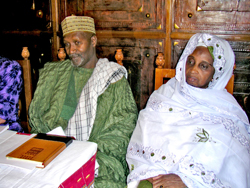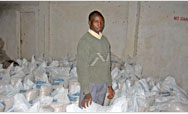You are here » Home » Telling Our Story
Success Story
Religious leaders from five countries discuss family planning
Muslim Leaders Promote Family Planning

| |
Photo: USAID/Sana Guindo
|
|
Religious leaders from West and East Africa discuss family planning and reproductive health issues at a USAID-sponsored workshop in Bamako, Mali.
Religious leaders asserted that must not only advocate — they must also take action. As one conference participant pointed out, “In the case of early marriages ... religious leaders can advocate for imams to stop blessing early marriages.”
|
Religious leaders from Mali, Ghana, Senegal, Mauritania, and Uganda gathered together as part of a USAID-funded project to talk about family planning and reproductive health. The meeting, held in Bamako, Mali, brought together influential male and female religious leaders, social organizations, and representatives of Islamic communities from these five countries. At the end of the meeting, participants concluded that reproductive health and family planning are compatible with Islamic ideology and that as community leaders they should work together to promote these important health initiatives.
Workshop participants considered ideas for raising the visibility of family planning and educating people about its importance. Religious leaders and scholars discussed best practices; identified the major educational, social, cultural, and political challenges to family planning; and considered how to reinforce each others’ efforts to engage members of their respective religious institutions in promoting family planning and reproductive health. The workshop included analyses of Koranic references to reproductive health and family planning, the role of religious leaders in these sectors, the importance of birth spacing, and the importance of family planning and reproductive health in a national HIV/AIDS strategy.
Participants considered steps to creating a regular dialog between Islamic and Christian religious leaders and helping them champion family planning initiatives. They discussed methods for using economic and scientific data and Koranic references to support birth spacing and educate people about the negative impact of high fertility rates. As one participant said, “Advocacy for religious leaders means seeking change in policies within the Muslim community as well as in the government and other sectors. For example, in the case of early marriages that lead to high fertility rates, premature childbearing and problems such as obstetric fistula, professionals and technicians can educate and inform the population to try and reduce such problems, but religious leaders can advocate for imams to stop blessing early marriages.” Exchanges of this nature are helping leaders identify best practices and develop local strategies for improving the economic, health, and social situations of women, children, and families through effective reproductive health campaigns.
Print-friendly version of this page (552kb - PDF)
Click here for high-res photo
Back to Top ^ | 

